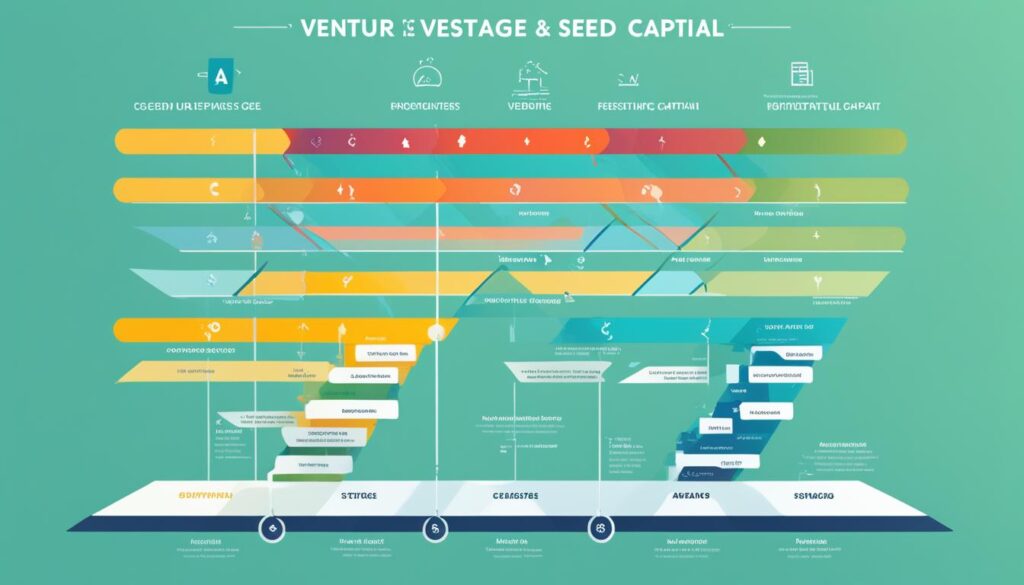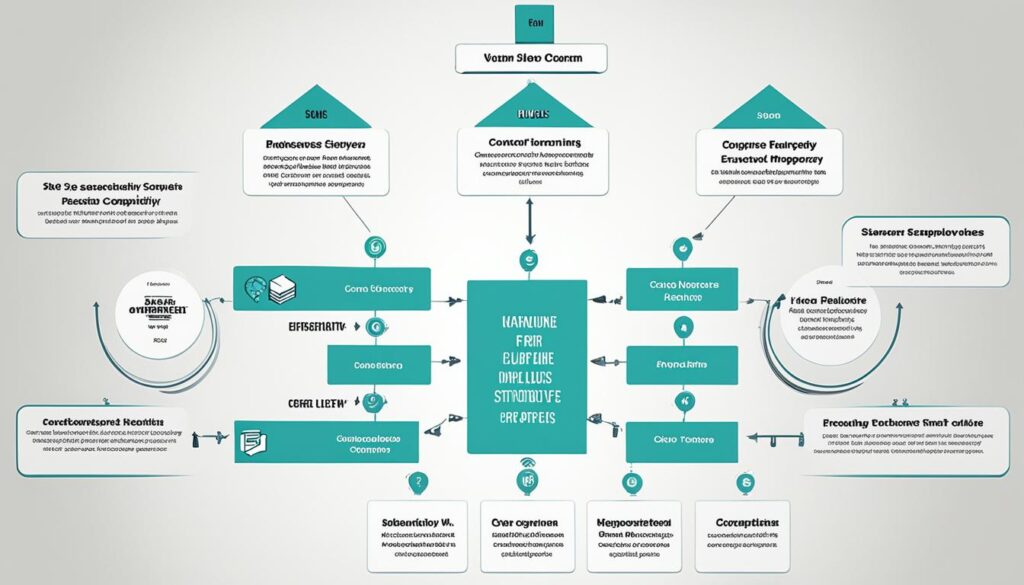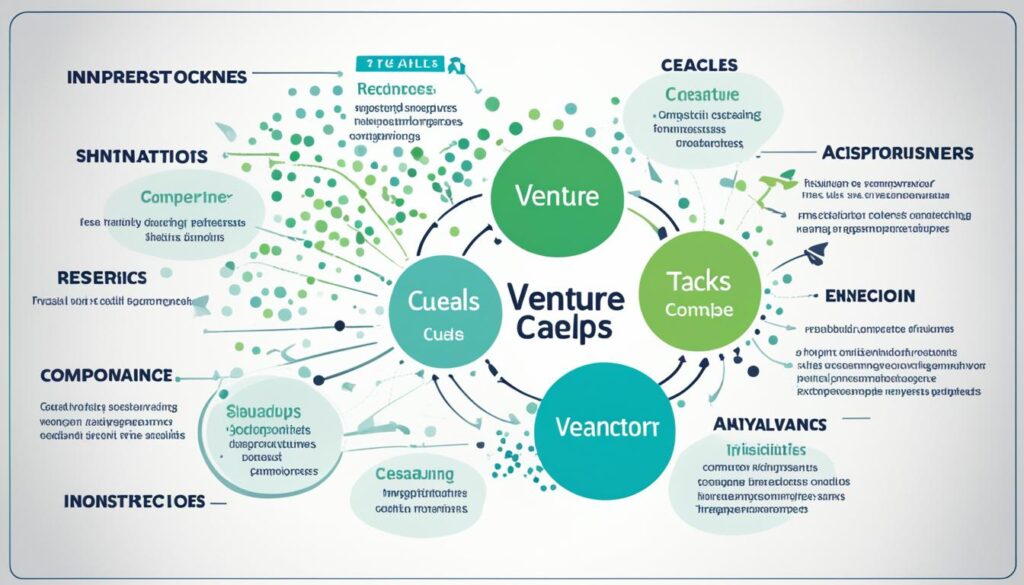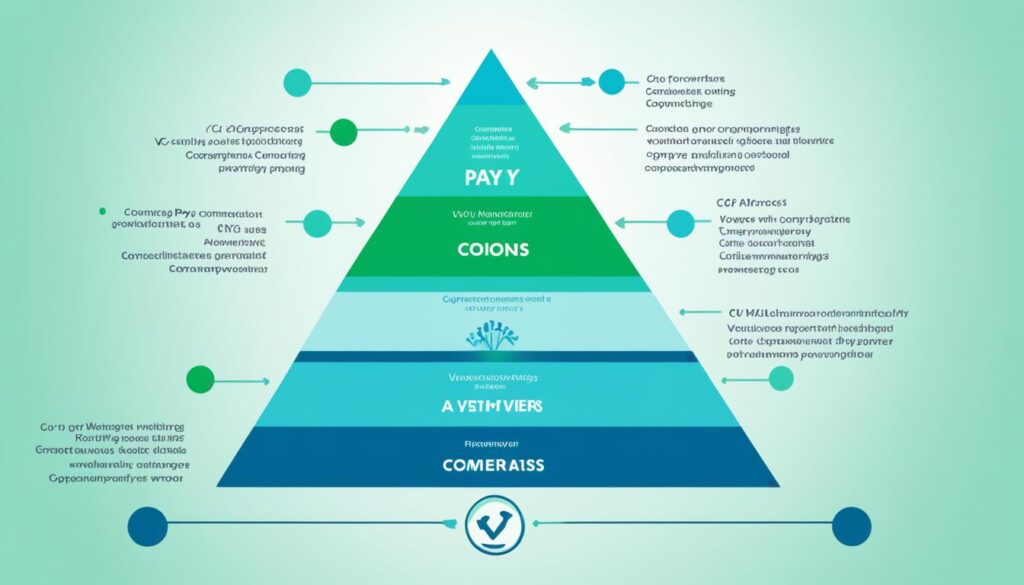Have you ever wondered what the most lucrative position in the venture capital (VC) industry is? Well, the data suggests that the role of General Partner or Managing Director typically commands the highest compensation in the VC world. These senior-level professionals can earn total compensation ranging from $500,000 to over $2 million annually, with a significant portion of this coming from carried interest or “carry” – a share of the investment profits earned by the venture capital firm.
What makes these General Partner and Managing Director roles so highly compensated? Well, they are the decision-makers and firm representatives who are responsible for raising funds, making investment decisions, and supporting portfolio companies. Their high compensation reflects their critical role in the venture capital firm’s success and ability to generate strong returns for investors.
Key Takeaways
- The highest paying position in venture capital is typically the General Partner or Managing Director role.
- General Partners can earn total compensation ranging from $500,000 to over $2 million annually.
- A significant portion of their compensation comes from carried interest or “carry” – a share of the investment profits.
- Senior Partners and Managing Directors are responsible for fundraising, investment decisions, and portfolio company support.
- Their high pay reflects their critical role in the VC firm’s success and ability to generate strong returns.
Understanding Venture Capital
Venture capital (VC) refers to the financing that startups and small businesses with exceptional growth potential receive in exchange for equity. Venture capitalists are investors who provide this capital to early-stage, high-risk companies in the hopes of earning exceptional returns if the companies are successful.
Definition of Venture Capital
Venture capital is a type of private equity financing that is provided by investors, often in the form of institutional investors or high-net-worth individuals, to early-stage, innovative companies with the potential for rapid growth. These investments are typically made in exchange for an ownership stake in the company, with the goal of generating significant returns if the company is successful.
Role of Venture Capitalists
Venture capitalists play a critical role in funding innovation and helping high-potential startups scale their businesses. They not only provide the necessary capital but also offer strategic guidance, industry expertise, and access to their networks to support the growth of their portfolio companies.
Stages of Venture Capital Investment
The main stages of venture capital investment include:
- Sourcing and evaluating potential investments
- Conducting due diligence on promising startups
- Negotiating deal terms and structuring the investment
- Providing ongoing support and guidance to portfolio companies
- Exiting successful investments through acquisitions or initial public offerings (IPOs)
Throughout these stages, venture capitalists work closely with entrepreneurs to help them navigate the challenges of building and scaling their businesses, ultimately aiming to generate outsized returns for their investors.

Hierarchy in Venture Capital Firms
Venture capital firms typically operate with a hierarchical structure, offering a range of job titles and levels of seniority. Understanding this hierarchy can provide valuable insights into the venture capital career path and the responsibilities associated with each role.
Analyst
Analysts are typically the entry-level positions within a venture capital firm. Their primary responsibilities include conducting research, gathering market data, and performing due diligence on potential investment opportunities. Analysts play a crucial role in the deal sourcing and evaluation process, supporting the firm’s investment decisions.
Associate (Pre-MBA)
Associates, both pre-MBA and post-MBA, are more actively involved in the deal sourcing and evaluation process. They work closely with Analysts to identify promising startups, conduct in-depth analyses, and participate in the negotiation of investment terms. Pre-MBA Associates often have prior experience in sectors like investment banking, management consulting, or startup business development.
Senior Associate (Post-MBA)
Senior Associates, who typically have an MBA degree, take on more responsibility in the venture capital firm’s operations. They are often involved in portfolio company support, helping founders navigate challenges and achieve their growth objectives. Senior Associates may also contribute to the firm’s fundraising efforts and represent the firm in various industry events.
Principal or Vice President
Principals or Vice Presidents hold more senior positions within the venture capital firm hierarchy. They are responsible for managing the firm’s portfolio companies, providing strategic guidance, and collaborating with founders to drive the success of their businesses. Principals or VPs often play a pivotal role in the firm’s investment decision-making process.
Partner or Junior Partner
Partners or Junior Partners are professionals who are in training to become the most senior members of the venture capital firm. They are involved in all aspects of the firm’s operations, from deal sourcing and due diligence to portfolio management and fundraising. Partners are often groomed to eventually become General Partners or Managing Directors.
General Partner or Managing Director
General Partners or Managing Directors are the most senior members of the venture capital firm. They are responsible for making the final investment decisions, raising funds from Limited Partners, and representing the firm in the broader entrepreneurial ecosystem. General Partners are the key decision-makers who guide the firm’s investment strategy and overall direction.

| Job Title | Responsibilities | Typical Background |
|---|---|---|
| Analyst | Research, due diligence, deal sourcing support | Entry-level, often fresh graduates or 1-2 years of experience |
| Associate (Pre-MBA) | Deal sourcing, evaluation, some portfolio company support | 1-3 years of experience, often in investment banking, consulting, or startups |
| Senior Associate (Post-MBA) | Portfolio company support, fundraising, representing the firm | 4-6 years of experience, with an MBA degree |
| Principal or Vice President | Portfolio management, investment decision-making, firm representation | 6-10 years of experience, often with deep industry expertise |
| Partner or Junior Partner | All aspects of firm operations, including fundraising and decision-making | 10+ years of experience, groomed to become General Partners |
| General Partner or Managing Director | Final investment decisions, fundraising, firm strategy and representation | 15+ years of experience, the most senior members of the firm |
Responsibilities of Key Roles
Venture capital professionals have a variety of responsibilities, which can be grouped into four main areas: deal sourcing and evaluation, due diligence and investment analysis, portfolio company support, and fundraising and investor relations. These VC job responsibilities and venture capital career duties are crucial for the success of a VC firm and its portfolio companies.
Deal Sourcing and Evaluation
Junior-level VCs like Analysts and Associates spend more time on sourcing deals and conducting initial investment analysis. This involves networking extensively, researching emerging industries and trends, and evaluating potential investment opportunities that align with the firm’s investment thesis. They use a variety of tools and techniques, such as financial modeling and market assessments, to assess the viability and growth potential of startups.
Due Diligence and Investment Analysis
As part of the what do VCs do in terms of due diligence and investment analysis, venture capital professionals conduct in-depth examinations of a startup’s financials, management team, market positioning, and growth plans. They scrutinize the company’s technology, competitive landscape, and potential risks to determine the overall risk-reward profile of the investment.
Portfolio Company Support
More senior VCs like Principals and Partners focus more on portfolio company support, leveraging their experience and network to help startups navigate challenges, scale their operations, and achieve their strategic objectives. This may involve serving on the board of directors, providing strategic advice, making key introductions, and assisting with fundraising or M&A activities.
Fundraising and Investor Relations
Across all levels, VC job responsibilities also include fundraising and investor relations. Venture capital professionals must build and maintain strong relationships with Limited Partners (LPs), who provide the capital that VC firms invest. They are responsible for marketing the firm’s investment strategy, track record, and value proposition to secure new commitments and retain existing investors.

What is the highest paying position in venture capital?
As mentioned in the first section, the highest paying position in venture capital is typically the General Partner or Managing Director role. These senior-level positions can earn total compensation ranging from $500,000 to over $2 million annually, with a significant portion of this compensation coming from carried interest or “carry” – a share of the investment profits earned by the venture capital firm.
The high pay for General Partners reflects their critical role in the firm’s success, as they are responsible for fundraising, making investment decisions, and supporting portfolio companies to drive strong returns. These most lucrative VC roles are essential to the venture capital firm’s ability to generate exceptional returns for its investors.

Compensation Structure in Venture Capital
Venture capital compensation is structured around three main components: base salary, bonuses, and carried interest (carry). Understanding the nuances of this VC compensation model is crucial for both aspiring and seasoned professionals navigating the dynamic world of venture capital salaries and bonuses.
Base Salary
The base salary for venture capital professionals is typically derived from the management fees charged by the VC firm, which are usually around 2% of its total assets under management. This fixed compensation component provides a reliable source of income and helps to attract and retain top talent within the industry.
Bonuses
In addition to base salaries, venture capital professionals may also receive bonuses, which are often tied to the firm’s overall performance and the individual’s contributions to the firm’s success. These bonuses can be a significant portion of a VC’s total compensation, especially for more senior-level roles.
Carried Interest (Carry)
The most lucrative component of venture capital compensation is carried interest, or “carry.” Carry represents a share of the investment profits earned by the VC firm, typically ranging from 4% to 20% for General Partners. This performance-based compensation provides venture capitalists with the opportunity to earn outsized returns if the firm’s investments are successful. However, carry is also more “lumpy” and uncertain compared to base salaries and bonuses, as most VC investments ultimately end up failing.

Factors Influencing Venture Capital Compensation
Several key factors play a significant role in determining compensation levels within the venture capital (VC) industry. Firm size and performance are major drivers, as larger, more established VC firms with a track record of strong investment returns can afford to pay higher salaries and offer more carried interest (or “carry”) to their professionals.
The stage of investment focus also has an impact, with later-stage and growth equity firms tending to pay more than early-stage venture funds. This is often due to the increased complexity and higher stakes involved in later-stage investments.
Additionally, geographic location is a crucial factor in VC compensation. Venture capital hubs like Silicon Valley, New York, and Boston typically offer higher compensation compared to other regions. These geographic differences are driven by factors such as the concentration of high-growth startups, competition for talent, and the overall cost of living in these innovation-rich areas.

By understanding these key factors affecting VC compensation, what determines venture capital salaries, and geographic differences in VC pay, aspiring venture capitalists can better navigate the landscape and position themselves for successful and rewarding careers in this dynamic industry.
Salary Ranges by Position
Venture capital compensation can vary significantly depending on the specific job title and level within the firm. Let’s take a closer look at the typical salary ranges for different VC positions.
Analyst Compensation
Analysts, who are typically entry-level hires, can earn total compensation (base salary plus bonus) ranging from $60,000 to $210,000. These professionals focus on conducting research, performing due diligence, and supporting the deal execution process.
Associate Compensation
Pre-MBA Associates typically earn $100,000 to $350,000, while Senior Associates (post-MBA) can make $150,000 to $480,000. Associates play a more active role in sourcing deals, evaluating investment opportunities, and providing support to portfolio companies.
Principal or VP Compensation
Principals or Vice Presidents tend to earn $140,000 to $340,000. These more senior professionals are responsible for managing relationships with portfolio companies, contributing to investment decisions, and representing the firm in the market.
Partner or General Partner Compensation
At the top, General Partners or Managing Directors can earn total compensation of $500,000 to over $2 million, with a significant portion coming from carried interest. These senior-level VC professionals are the decision-makers who raise funds, make investment decisions, and oversee the firm’s portfolio companies.
Entry Points into Venture Capital
Breaking into the venture capital industry can take multiple paths, but there are three main entry points: pre-MBA, post-MBA, and as experienced professionals. Understanding these different routes can help aspiring venture capitalists navigate the competitive landscape and identify the best strategy to get their foot in the door.
Pre-MBA
The pre-MBA route is a common entry point for many venture capital roles, particularly at the Analyst or Associate level. Candidates in this category typically come from backgrounds like investment banking, management consulting, or startup business development. These individuals join VC firms directly after completing their undergraduate studies, leveraging their analytical skills and industry experience to contribute to deal sourcing, due diligence, and portfolio company support.
Post-MBA
The post-MBA entry point is another popular way to transition into venture capital. Professionals with prior technical or industry experience, such as engineering or sales at an enterprise tech company, often pursue an MBA and then join VC firms as Associates or Senior Associates. Their combination of practical knowledge and advanced business education makes them attractive candidates for VC firms seeking individuals who can understand both the market/customer side and the technical details of potential investments.
Experienced Professionals
In addition to the pre-MBA and post-MBA paths, experienced professionals can also break into the venture capital industry, often at more senior levels. This includes successful startup founders or high-level executives who have deep industry expertise and extensive networks. These individuals can join VC firms as Principals, Partners, or even General Partners, leveraging their proven track record and industry knowledge to identify and support the next generation of high-growth companies.
Regardless of the entry point, breaking into venture capital is highly competitive, and VC firms seek candidates who possess a unique blend of technical skills, industry experience, and an entrepreneurial mindset. Networking, demonstrating a genuine passion for supporting startups, and developing a strong understanding of the venture capital industry are all critical steps for those aspiring to join this dynamic field.

Skills and Qualifications
To succeed in the competitive venture capital industry, professionals must possess a specific set of skills and qualifications. Technical knowledge, such as financial modeling and data analysis, is essential, particularly for roles focused on deal execution. Industry experience, especially in high-growth sectors like technology and healthcare, is also highly valued, as it helps venture capitalists identify promising startups and understand their markets.
Technical Knowledge
Venture capital firms seek candidates with strong financial acumen and the ability to analyze complex data sets. Proficiency in financial modeling, valuation methodologies, and due diligence techniques is crucial for evaluating potential investments and structuring deals.
Industry Experience
Relevant industry experience, particularly in the sectors that venture capital firms focus on, can give candidates a significant advantage. Understanding the competitive landscape, customer needs, and growth dynamics of high-potential industries like technology, healthcare, and consumer products can help venture capitalists identify promising startups and effectively support their portfolio companies.
Networking and Communication Skills
Successful venture capitalists must possess excellent networking and communication skills. Building relationships with entrepreneurs, fellow investors, and industry experts is essential for sourcing deals, conducting due diligence, and representing the firm. The ability to clearly articulate investment theses, negotiate deal terms, and provide strategic guidance to portfolio companies is equally important.
While a background in investment banking, consulting, or startups is common, venture capital firms also seek out individuals with diverse experiences and a deep passion for supporting entrepreneurship. The combination of technical expertise, industry knowledge, and exceptional communication skills is key to thriving in the dynamic and competitive venture capital landscape.

Pros and Cons of a Venture Capital Career
Pursuing a career in venture capital has both advantages and disadvantages. On the positive side, VC professionals have the opportunity to work closely with innovative startups, contribute to their growth, and potentially earn outsized financial returns if the firm’s investments are successful. The work can be intellectually stimulating, and VC firms often have a dynamic, entrepreneurial culture.
Advantages
One of the main upsides of a VC career is the chance to be involved in the development of groundbreaking technologies and business models. Venture capitalists play a critical role in funding innovation and helping high-potential startups scale their operations. This can be an exciting and rewarding experience, as VC professionals get a front-row seat to witness the growth and success of the companies they invest in.
Additionally, the compensation structure in venture capital, with its emphasis on carried interest, offers the potential for significant financial upside if the firm’s investments perform well. While base salaries and bonuses may be lower compared to other finance roles, the opportunity to earn a share of the firm’s investment profits can lead to outsized returns for successful venture capitalists.
Disadvantages
However, the pros and cons of working in venture capital also include several downsides. One of the primary challenges is the generally lower compensation levels, especially for junior-level roles, compared to investment banking, private equity, and hedge funds. The work can also be highly stressful, with long hours and high pressure to source deals and generate returns for the firm’s investors.
Additionally, job security in the venture capital industry can be uncertain, as VC firm performance is often “lumpy” and dependent on the success or failure of the firm’s investments. There are also limited pathways for advancement, especially at the junior level, with fewer opportunities to progress to the coveted Partner or General Partner roles that offer the most lucrative compensation.

| Advantages of a VC Career | Disadvantages of a VC Career |
|---|---|
|
|
Overall, while a career in venture capital can be intellectually stimulating and potentially financially rewarding, it also comes with significant challenges that aspiring VC professionals should carefully consider before pursuing this career path.
Conclusion
In conclusion, the highest paying position in the venture capital industry is typically the General Partner or Managing Director role, which can earn total compensation ranging from $500,000 to over $2 million annually. This lucrative pay reflects the critical responsibilities of these senior-level VC professionals, who are responsible for fundraising, making investment decisions, and supporting portfolio companies to drive strong returns for their firms.
Venture capital compensation is structured around a mix of base salaries, bonuses, and carried interest (carry), with carry being the most potentially rewarding but also the most uncertain component. Breaking into the competitive VC industry requires a blend of technical skills, industry expertise, and an entrepreneurial mindset. While a career in venture capital can be intellectually stimulating and financially rewarding, it also comes with significant challenges, including long hours, high stress, and limited advancement opportunities, especially at the junior level.
In summary, the key takeaways on venture capital careers are the potential for high compensation at the senior level, the importance of specialized skills and experience, and the trade-offs between the upsides and downsides of working in this dynamic, fast-paced industry. Aspiring venture capitalists must carefully weigh these factors when considering this exciting, yet demanding, career path.
